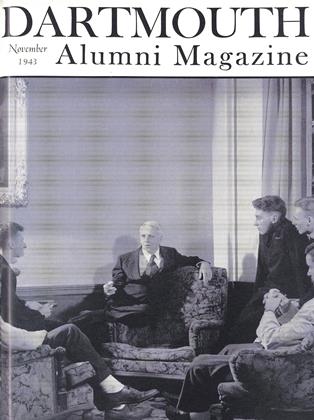by Hastings Lyon '01. New York, John Felsberg, Inc., 1943. PP. 135- $1.75.
In the foreword to this Tract for the Times the author sets forth a sort of credo which attracts in ant attention for its challenging possibilities, He states:
"I believe that a voluntary economy functioning by "the principle of choice affords the soundest economic foundation for a political democracy, and that society should exert itself ,*.6 suppress advantage seeking monopolistic endeavor from whatever source, capitalist or proletarian. It seems to me, however, that at the present moment the proletariat presents the more serious menace."
One expects, from the first sentence, a modern reassertion of laissez-faire but not condemnation of all measures which liberal believers in the doctrine have supported, such as, for example, social security legislation. From the second sentence one is prepared for observations which may expose practices, and these could be timely and significant contributions, if not one-sided. The chapter titles, indicating the dominant point of view, may be illustrated by, Fallacy of Unequal Bargaining Power, Monopolistic Psychology ofthe Proletariat, or Privileged Proletarians. The reader wonders, as he proceeds, when the boat will right itself. Instead it continues to sail at a sharp angle and there is no attempt to shift ballast.
One enjoys at first the pungency of expression and the novelty of the outspoken sentiments. There is sharp truth in such sentences as: Essentially the picket line is not a formof free speech but a form of nuisance, (p. 27), or A labor leader who maintains or increases a wage at the cost of unemploymentclaims credit for the achievement of the wageand disclaims responsibility for the cost (p. 55.)
But the treatment is harsh towards labor and unsympathetic to the social problem. The measures proposed seem more applicable to a social vacuum and the general tone of the book will not convince those who might most have needed a bold but balanced view. But the book is most readable and the content is provocative.
Using the Wealth of the World, a Textbook in Economics, by Robert I. Adriance '06, a book of 429 pages, has been published by Little Brown and Company. The price is $1.00. This text by Mr. Adriance, Head of the Social Science Department, East Orange High School, is intended for High School students and is based on the author's teaching experience covering many years. It is published now, say the publishers, So as to give the average High School student information about the basic economic facts which affect him today." This clear, straightforward text is well illustrated and will no doubt prove of great value to High School teachers and students. The College graduate who failed to take Economics in College will find this elementary book a practical one and well worth reading.
A History and Critisism of American Public Address prepared under the auspices of the National Association of Teachers ofSpeech, edited by William N. Brigance, has been published in two volumes by McGrawHill Book Company. Volume 1 contains a section by Professor George V. Bohman, TheHistorical Background of American PublicAddress The Colonial Period. This volume also contains a sketch of Rufus Choate, Dartmouth 1819, by John W. Black of Kenyon College. Volume 2 contains a sketch of Daniel Webster, Dartmouth 1801, by Wilbu.' S. Howell of Princeton and Hoyt H. Hudson of Stanford University. This volume also contains a sketch of Woodrow Wilson by 1 rofessome. payton D. McKean. Another chapter in the book is Abraham Lincoln: His Emergence AsThe Voice of the People, by Earl W. Wiley 99 of Ohio State University.
The Land of the Polish People, by Professor Eric P. Kelly '06, will be reviewed in a later issue of the MAGAZINE.
Volume 22 of Biographical Memoirs ofthe National Academy of Sciences of theUnited States of America contains a memoir of Raymond Pearl '99 by H. S. Jennings. This memoir contains an extensive bibliography of the works of Dr. Pearl which was begun by the author himself and continued by members of his Department.
 View Full Issue
View Full Issue
More From This Issue
-
 Article
ArticleROBERT FROST RETURNS
November 1943 By CHARLES G. BOLTE '41 -
 Article
ArticleWILLIAM JEWETT TUCKER
November 1943 By ALEXANDER LAING '25 -
 Lettter from the Editor
Lettter from the EditorLetters from Dartmouth Men in the Armed Forces
November 1943 -
 Class Notes
Class Notes1918
November 1943 By ERNEST H. EARLEY, DONALD L. BARR -
 Class Notes
Class Notes1937
November 1943 By JOHN H. DEVLIN JR., FRANCIS T. FENN, JR. -
 Class Notes
Class Notes1917
November 1943 By MOTT D. BROWN JR., DONALD BROOKS
Books
-
 Books
BooksJAMES WILSON: FOUNDING FATHER, 1742-1798.
July 1956 By A. L. DEMAREE -
 Books
BooksTHE THEORY OR RESONANCE AND ITS APPLICATIONS TO ORGANIC CHEMISTRY
May 1945 By Andrew J. Scarlett '10 -
 Books
BooksCOTTON TEXTILE WAGES IN THE UNITED STATES AND GREAT BRITAIN
January 1949 By C. E. Dankert -
 Books
BooksSCRATCHY
May 1951 By HELEN GARRISON -
 Books
BooksA SWINGER OF BIRCHES:
June 1957 By JAMES M. COX -
 Books
BooksELEMENTARY STATISTICS FOR ECONOMICS AND BUSINESS: SELECTED READINGS.
NOVEMBER 1970 By RICHARD STUART BOWER


